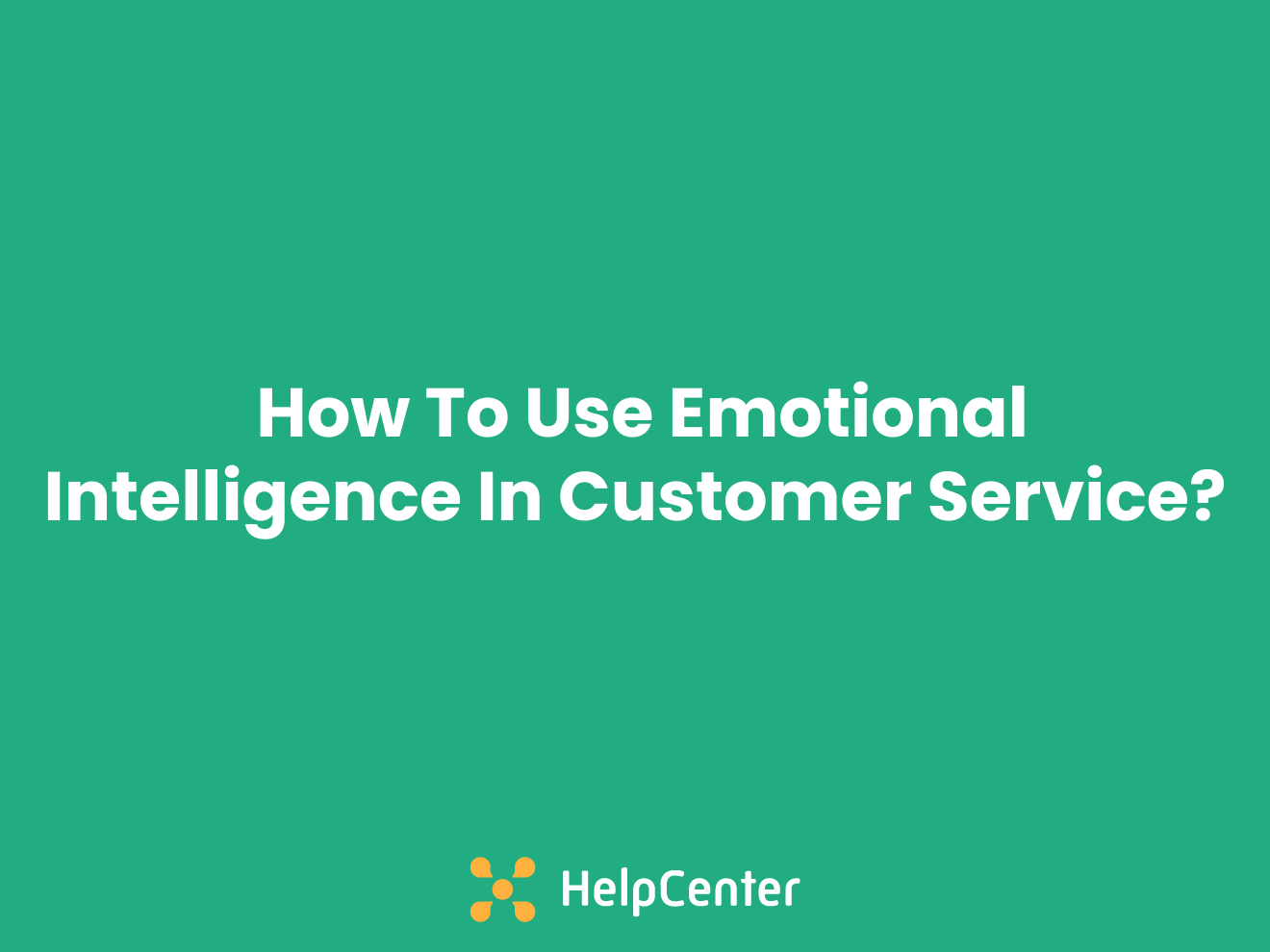You may also like:
- How To Show Empathy In Customer Service (6 Best Practices)
- Nurture These 8 Customer Service Skills For Your E-Commerce Business Growth
The importance and impact of emotional intelligence in customer service are nothing new. The way customers feel after interacting with your support team can greatly influence their purchasing decisions. In fact, 81% of shoppers admit that they would be more likely to make another purchase after a positive customer service experience. Enhancing customer satisfaction with emotional intelligence can give your brand a competitive edge.
If your brand can offer real, human interactions that many people want, and you know how to create a strong connection with customers, you will be one step ahead of your competitors.
So how to build emotional intelligence and make sure that people have an enjoyable shopping experience and are willing to return?In this article, you will learn what is emotional intelligence in customer service, 4 essential skills associated with it, and how to use emotional intelligence to enhance customer engagement and drive your business growth
What is emotional intelligence?
Emotional intelligence (EI) is a range of skills that helps us recognize, understand and manage our own emotions as well as put all these skills to work in order to recognize, understand and influence the emotions of others.
Understanding how effective you are at controlling your own emotional energy is a great starting point to realizing how people perceive you, and how your actions affect people around you. By consciously placing emotional intelligence at the center of customer experience strategy, your business will be able to provide much better customer service and have more satisfied customers.
Importance and benefits of emotional intelligence in customer service
Your team and each team member's ability to communicate effectively as well as strategically is fundamental to effective customer service.
A customer service team who can handle complaints in a pleasant manner, gently tame overflowing emotions that rise from frustrating situations in a calm and timely way, and can fully focus on a customer will make your brand stand out.
Here are some benefits of using emotional intelligence in customer service:
- Increased customer loyalty. Customers who undergo a positive experience with a company and feel emotionally attached to it are less likely to consider other alternatives the next time they need to make a purchase. Since they feel valued, they tend to return.
- Positive word-of-mouth. Personal recommendations can go a long way - they’re much more powerful and influential than just reading something on the internet. Therefore, building emotional connections can help you increase the chance that your customers will be spreading a good word about your brand to their friends and family, driving new shoppers to your store.
- Happier support agents. Yes, this goes both ways - the team that is able to maintain a positive bond with customers will likely be more productive and motivated to do their best.
- Sales boost. All of the above combined can significantly help you make more sales, thus leading to business growth.

How to build emotional intelligence as a customer service representative?
There are four areas that need your attention if you want to harness emotional intelligence. Mastering them will help your team to make an emotional connection with each and every customer, no matter their own personal feelings about the situation they are in.
1. Be aware of your own emotions
Getting a grasp over one’s emotions helps to take control and prevent situations where feelings take over.
Recognizing your own emotions helps to understand how they affect your thoughts and behavior. And only once this knowledge is acquired, it is possible to start understanding the feelings of those around us.
By encouraging self-awareness in customer service, it is possible to guarantee that the people communicating with customers are more mindful of their behavior and consistently want to work on improving themselves.
This can help to avoid situations where a user, who is already very frustrated and has lashed out either via email or over the phone, receives a similar response in return. This would only add fuel to the fire and no one would ever benefit from it, least of all the brand itself.
2. Develop self-management skills

Self-awareness and self-management are rather inseparable from one another. However, controlling your emotions is one thing, and coping with the stress that comes from being in frustrating and repetitive situations all day long is something else.
This is why managing the stress of emotional labor is of high importance.
Below is a list of some self-management skills that will help you to be more productive and enjoy what you are doing.
- Stress resistance
Learning to react to stressful situations can help you avoid mistakes that people usually make when they are stressed out. When you feel that things are getting out of hand, take a little break and come back to the task once you’re ready so that your productivity wouldn’t go down.
- Communication and time management
Efficiently communicating to other people with minimized distortion and in a timely manner can boost your productivity. You could try making a checklist of the tasks that need to be done and analyze your performance after each day.
- Physical activity and rest
Yes, being active as well as getting enough rest is crucial for performing well at work and avoiding collapsing mentally. Keep your mind and body in a good shape and set clear boundaries for yourself - there needs to be a time in the day where you are not constantly checking your work email and worrying about what tomorrow may bring.
3. Keep yourself motivated

Self-motivation is a crucial thing to get things moving, yet this can be quite difficult. The first thing you need to do is to be clear about what you want to achieve and align your values with your goals.
There’s no point in setting a huge goal straight away, like getting a promotion, as this is something a little too abstract and you most likely won’t commit to it. While this might be the end goal, try to find some middle checkpoints that are easily achievable and trackable. This way, you will keep yourself motivated and enthusiastic throughout the process.
Another important thing is to train your mind to be positive. This does not mean that you always need to see things in a positive light - instead, create positivity by rewarding yourself once you have achieved a goal. Rewards don’t necessarily need to be big and it could be as simple as taking a break after a challenging task.
4. Learn to be more empathetic
Empathy in customer service plays a huge role in overall customer experience. It is one of the key skills of emotional intelligence and comes in particularly handy for customer service interactions.
However, before being able to put yourself in somebody else's shoes and understand how and why they are feeling a certain way, you will need to be able to recognize and understand your own feelings.
One of the things you can do while communicating with a disappointed customer or angry customer is to acknowledge their frustration. People are likely to forgive a company for its mistake after receiving excellent service – and according to Salesforce research, 78% of customers agree with this statement.
When you attempt to connect with customers’ struggles, they feel supported. They need to feel that you genuinely want to help and make a difference.
Here are some statements that could be used next time an unhappy customer reaches out:
- “I understand how frustrating it must be…”
- “I am sorry that you have faced such a problem...”
- “Thank you so much for notifying us about the issue.”
- “I know you have spent a lot of time on this already.”
- “Thank you for your patience.”
- “We assure you to fix your issue as soon as possible. We will be in contact shortly.”
This might not seem a lot, but when customer service reps are missing empathy, they have a difficult time connecting to customers’ feelings and thoughts. This can come across as a lack of interest and lack of engagement, and result in dissatisfaction that leads to a lost customer.
Everything is connected
All the emotional intelligence skills mentioned above are intertwined. But it all comes down to providing humane customer support and creating enjoyable experiences - for customers, for yourself, and your team members.
When we are able to perceive and manage our own emotions, we are bound to do better in a conflict. By anticipating how customers are feeling and adapting our responses accordingly, we can solve issues in a mutually beneficial way and provide satisfactory customer service.Keep working on your self-awareness and mindfulness. Become aware of your emotional triggers. Set clear goals. Recognize and celebrate your positive emotions. And influence others around you.




